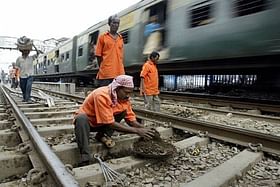In what could be termed as serious lapses on the part of Indian Railways, a parliamentary panel has found that there were 19,700 instances of cable-cut across its zones in the past five years.
Additionally, in 11,760 such cases, the Railways did not even impose penalties for violation of procedures laid down.
The Public Accounts Committee (PAC) in its report has called for strict safety measures and adherence to joint procedure orders (JPO) by Indian Railways, following procedural lapses during maintenance works that led to cable faults.
The PAC, chaired by Congress MP Adhir Ranjan Chowdhury, in its report tabled in Parliament also pointed out lacunae in adhering to JPOs relating to the digging work near signalling, electrical and telecommunication cables.
Stating that such lapses could lead to severe mishaps, the PAC said the recent accident involving Coromandel Express in Balasore “serves as a stark reminder” of the serious consequences such incidents may have, and requires immediate action, including investing in advanced technology.
“The committee observes that to mitigate such risks, the ministry must take immediate action and invest in advanced technology for proactive fault detection,” the panel headed by Chowdhury said in its report, which was submitted in Lok Sabha on Thursday (10 August).
It said that the Railways should plan for a common duct for all signal, electrical and telecommunication systems, which would minimise cable cuts and ensure safety of the rail network.
The PAC report is based on the Comptroller and Auditor General report of 2021 which had flagged the railways’ failure to implement the JPOs relating to digging work near signalling, electrical and telecommunication cables, which had led to damaged cables in South Eastern Railway and West Central Railway.
The committee took note that the Railway Ministry had issued the JPO in 2004 to address cable protection after a major accident in Northern Railway.
It also took note of how the national transporter increased the penalty for non-compliance, to prevent careless digging by executing agencies and to reduce instances of cable cut.
The panel said there was a visible lack of coordination among various departments of the Railways and stressed that many times, the railway administration had not provided cable route plans to contractors.
“The committee, therefore, feels that the railway administration should invariably provide cable route plans to the contractors before initiating any work,” the report said.


